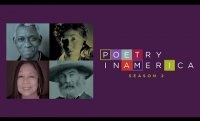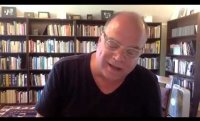Genre: Poetry
Zócalo Public Square Poetry Prize Deadline Nears
Submissions are open for the tenth annual Zócalo Public Square Poetry Prize. Given to a U.S. poet for a poem which “evokes a connection to place,” the prize includes $1,000, publication on the Zócalo website, and an invitation to read the winning poem at an awards event in spring 2021. Unexpected or unconventional interpretations of the theme of place are welcome. Poets are encouraged to consider places “of historical, cultural, political, or personal importance” and landscapes that may be “literal, imaginary, or metaphorical.”
Submit up to three poems of any length via e-mail by January 29. The editors will judge. There is no entry fee. Visit the website for complete guidelines.
Founded in 2003 and based in Los Angeles, Zócalo Public Square publishes journalism alongside essays and poetry and seeks to “connect people to ideas and to each other by examining essential questions in an accessible, broad-minded, and democratic spirit.” Recent winners of its poetry prize include Jai Hamid Bashir and Erica Gross.
GalleyCrush: Tributary

Carey Salerno’s Tributary, forthcoming from Persea Books on April 20, 2021.
Inaugural Poet Amanda Gorman
“Poetry is an art form, but, to me, it’s also a weapon, it’s also an instrument. It’s the ability to make ideas that have been known, felt and said.” In this PBS NewsHour interview, Amanda Gorman speaks with Jeffrey Brown about her love of poetry and the writing process for her poem for this year’s presidential inauguration. Gorman is the nation’s first youth poet laureate and won a Barnes & Noble Writers for Writers Award from Poets & Writers in 2020.
Titular
“A title has the capacity to do an immense amount of heavy lifting,” writes torrin a. greathouse in the January/February 2021 issue of Poets & Writers Magazine. “It is what calls a reader into the work; it can construct an entire world before they enter it and is the first frame of reference for it once they have left it.” This week, choose an abandoned draft of a poem and revise it by changing its title. How is the tension raised by creating a new way for the reader to enter the poem? How has the poem stopped being stagnant and lifted off?
Upcoming Contest Deadlines
In these uncertain times, set aside a weekend to escape into your writing and submit to contests. With deadlines of January 30 or January 31, these awards include grants for women writers and a prize for a manuscript on the subject of music. All feature a cash prize of $1,000 or more.
AKO Caine Prize for African Writing: A prize of £10,000 (approximately $12,860) is given annually for a previously published short story by an African writer. Shortlisted writers will receive £500 (approximately $643). Writers who were born in Africa, who are African residents, or who have a parent who is African by birth or nationality are eligible. Deadline: January 31. Entry fee: none.
Austin Community College Balcones Prizes: Two prizes of $1,500 each are given annually for a poetry collection and a book of fiction published during the previous year. Deadline: January 31. Entry fee: $25 for poetry and $30 for fiction.
Black Lawrence Press Big Moose Prize: A prize of $1,000, publication by Black Lawrence Press, and 10 author copies is given annually for a novel. The contest is open to traditional novels “as well as novels-in-stories, novels-in-poems, or other hybrid forms that contain within them the spirit of a novel.” The editors will judge. Deadline: January 31. Entry fee: $25.
Crazyhorse Writing Prizes: Three prizes of $2,000 each and publication in Crazyhorse are given annually for a poem, a short story, and an essay. Yona Harvey will judge in poetry, Rumaan Alam will judge in fiction, and Sabrina Orah Mark will judge in nonfiction. All entries are considered for publication. Deadline: January 31. Entry fee: $20 (includes subscription).
Fish Publishing Short Memoir Prize: A prize of €1,000 (approximately $1,170) and publication in the Fish Publishing anthology is given annually for a short memoir. The winner is also invited to give a reading at the West Cork Literary Festival in July 2021. Blake Morrison will judge. Deadline: January 31. Entry fee: €18 (approximately $21) for online entries or €20 (approximately $23) for postal entries.
Ghost Story Screw Turn Flash Fiction Competition: A prize of $1,000 and publication on the Ghost Story website and in the 21st Century Ghost Stories anthology will be given annually for a flash fiction piece with a supernatural or magical realism theme. The editors will judge. Deadline: January 31. Entry fee: $15.
Iowa Review Awards: Three prizes of $1,500 each and publication in Iowa Review are given annually for works of poetry, fiction, and nonfiction. Tracie Morris will judge in poetry, Jamel Brinkley will judge in fiction, and Melissa Febos will judge in nonfiction. All entries are considered for publication. Deadline: January 31. Entry fee: $20.
Main Street Rag Poetry Book Award: A prize of $1,200, publication by Main Street Rag, and 50 author copies is given annually for a poetry collection. The editors and previous winners will judge. All entries are considered for publication. Deadline: January 31. Entry fee: $25 entry fee ($27 for electronic submissions).
Masters Review Short Story Award for New Writers: A prize of $3,000 and publication in Masters Review is given twice yearly for a short story by an emerging writer. The winning story will also be reviewed by a select group of literary agents. Writers who have published a book with a circulation of 5,000 or more copies are ineligible. Helen Oyeyemi will judge. Deadline: January 31. Entry fee: $20.
Money for Women/Barbara Deming Memorial Fund Individual Artists Grants for Women: Grants of up to $1,500 each are given in alternating years to feminist poets, fiction writers, and nonfiction writers who are citizens of the United States or Canada. The current round of grants will be awarded to poets and nonfiction writers. Deadline: January 31. Entry fee: $25.
New Millennium Writings New Millennium Writing Awards: Four prizes of $1,000 each and publication in New Millennium Writings are given twice yearly for a poem, a short story, a work of flash fiction, and a work of creative nonfiction. Previously unpublished works or works that have appeared in a journal with a circulation of under 5,000 are eligible. The editors will judge. Deadline: January 31. Entry fee: $20.
North Carolina Writers’ Network Thomas Wolfe Fiction Prize: A prize of $1,000 is given annually for a short story. The winning story will also be considered for publication in Thomas Wolfe Review. Therese Anne Fowler will judge. Deadline: January 30. Entry fee: $25.
Regal House Publishing Terry J. Cox Poetry Award: A prize of $1,000 and publication by Regal House Publishing is given annually for a poetry collection. Martha Kalin will judge. Deadline: January 31. Entry fee: $25.
Schaffner Press Nicholas Schaffner Award for Music in Literature: A prize of $1,000 and publication by Schaffner Press is given annually for a poetry collection, a novel, a short story collection, an essay collection, or a memoir that “deals in some way with the subject of music and its influence.” Deadline: January 31. Entry fee: $25.
Visit the contest websites for complete guidelines, and check out the Grants & Awards database and Submission Calendar for more contests in poetry, fiction, and creative nonfiction.
GalleyCrush: Double Trio

Nathaniel Mackey’s Double Trio, forthcoming from New Directions on April 6, 2021.
Poetry in America: Season Two
“How do you take the nightmares and dreams and put them onto paper?” asks Julie Taymor in this trailer for the second season of Poetry in America featuring interviews with Marilyn Chin, Katie Couric, Elena Kagan, John Kerry, Maxine Hong Kingston, and others. Created and directed by Harvard professor Elisa New, each episode explores and interprets a single American poem.
ENCLAVE Series With Peter Gizzi
In this installment of ENCLAVE, a virtual reading series curated by Rae Armantrout and Jeanne Heuving, poet Peter Gizzi reads from his collections Archeophonics (Wesleyan University Press, 2016) and Now It’s Dark (Wesleyan University Press, 2020), which is featured in Page One in the January/February issue of Poets & Writers Magazine.
COVID Vivid Interview: Joshua Nguyen
In the new year, I am keeping this series of interviews going, speaking with more Houston writers to ask how and what they’ve been doing since the start of the COVID-19 pandemic. I continue to enjoy and receive comfort from their responses to this question:
What have you been doing since the pandemic?
This week, we hear from Joshua Nguyen. Nguyen is a Vietnamese American writer, a collegiate national poetry slam champion (CUPSI), and a native Houstonian. He is the author of the chapbook, American Lục Bát for My Mother, forthcoming from Bull City Press, and has received fellowships from Kundiman, Sundress Academy for the Arts, and the Vermont Studio Center. Nguyen’s poetry has been published in the Offing, Wildness, American Poetry Review, the Texas Review, PANK, Auburn Avenue, Crab Orchard Review, and Gulf Coast magazine. Nguyen has been a guest on the Poetry Foundation’s VS podcast and Tracy K. Smith’s podcast The Slowdown. A bubble tea connoisseur who works in a kitchen, Nguyen received his MFA at the University of Mississippi where he is currently pursuing a PhD. You can find him on Twitter, @joshuanguyen03.
“Honestly, I don’t think I have written a poem since April. Don’t get me wrong, I have been shipping my manuscript out to open submission periods and book prizes, but in regards to new poems, it’s been hard to get into the excitement of creating forms. I have been writing more creative nonfiction. I think one reason why I have gravitated towards creative nonfiction during the pandemic is because it’s easier for my humor to come across in that form (in comparison to writing humor in poetry). And I think during these dark times, I need laughter more than ever. I also think that I have been afforded a kind of isolation with my thoughts which helps me come up with arguments, and counterarguments, for essays I’ve been writing. Most of my energy as a creative writing PhD student has been reading for my literature courses, creating lesson plans for the discussion sections I lead, working at my part-time job in the kitchen of a restaurant, and trying to stretch my butt in between Zoom classes so it doesn’t cramp up. I haven’t had time to write a poem, but I have had time to just sit and be alone with my thoughts whenever I’m resting my eyes between Zoom rooms. I am able to write those thoughts down at the end of the day, and then just turn them into essays.”
Photo: Joshua Nguyen. Lupe Mendez is the literary outreach coordinator for Poets & Writers in Houston. Contact him at Houston@pw.org or on Twitter, @houstonpworg.








